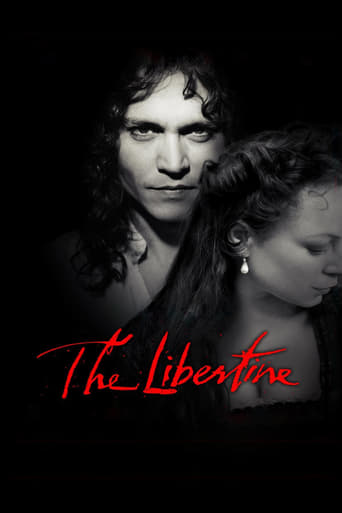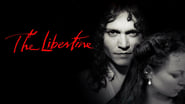brchthethird
Although its dour tone might put off a lot of viewers, Johnny Depp gives an awards-worthy performance as the 2nd Earl of Rochester, John Wilmot, one of the most controversial figures in British history. The film is based on a stage play by Stephen Jeffreys and focuses on the last years of Wilmot's life as he goes from being one of Britain's most celebrated poets and playwrights to practically drinking himself to death, all while being one of the most unsavory and unlikeable people I've ever seen portrayed on screen.I must give Johnny Depp credit because he turned in one of his finest performances. Even though his penchant for dressing up and putting on an accent in almost every movie he's done recently has reached the point of self-parody, it feels more natural and fresh here. However, the rest of the cast is no slouch either. John Malkovich gives a restrained performance as Charles II (reprising his stage role) and Samantha Morton also does well as Elizabeth Barry, an actress who Wilmot tutors then has an affair with. Also making appearances are Jack Davenport (Jack Sparrow's nemesis in Pirates of the Caribbean) as one of his friends, and Rosamund Pike as his wife, Elizabeth Malet. Obviously, now, Rosamund Pike has come into her own as an actress with GONE GIRL, but her supporting work here shows the chops she brought to that more recent role, even if she wasn't given a whole lot to do.Still, there will be some issues with this film for some. The big one is the cinematography. I've seen it described as murky or grainy, and while that might be true to an extent, I don't really see it as a serious problem. For one, this film was shot with mostly natural light, if not all, and the lack of vibrant color is appropriate to the overall tone of the film and Wilmot's character as portrayed therein (or at least how he views life). As a libertine, he saw life as banal and went out of his way to make things more interesting for himself by being an all-around jerk and debauching all of the time. Personally, I didn't mind this either, but I can see how others might not like him, especially when he goes out of his way to make this clear to others (and the audience, at the beginning and end) just how unlikeable and how much of a cynic he is. My way into the film and his character was an icy and sardonic sense of humor, which was employed often.Towards the end, it tries to be a little sentimental by showing his physical deterioration, and while this was still done effectively it undermined what came before it slightly. Despite my slight misgivings about the way things turn out in the final act, one of the best scenes in the entire film is in this section.Overall, this isn't a film I'd necessarily return to, but I don't regret having watched it given how depressing it is. The score which accompanied it was decent enough and, despite what you might feel about the look of the film, it meshes well with the overall tone and Depp's performance. Just don't go in expecting him to be as cheery, optimistic or likable as he is in almost everything else he's done.
jaybour1
As an actor and director, I am constantly amazed at the laziness of many actors vis-à-vis researching their roles. (For example, there are innumerable instances of actors who blithely commit major grammatical errors when they're supposed to be playing erudite language professors - e.g., "between you and I" instead of the correct "between you and me.") In THE LIBERTINE, which takes place in the 17th century, Johnny Depp, when using the word "flaccid," pronounces it "flassid." Now, any actor worth his salt would have researched the etymology of this word and discovered that the pronunciation of the word among the literati throughout the 17th century was always "flaksid." It was only in the 19th century that the alternate pronunciation, regrettably, came into vogue. Depp's error occurred early in the film and basically ruined the experience for me because I could no longer take him seriously as the literate poet and wit, John Wilmot. Do your homework, Depp!
kiwisago
I discovered this film after reading a biography of Charles II and looking up related material. For history buffs, this is a real find. It strives for authenticity much more successfully than the vast majority of historically-inspired films. For one thing, Malkovich really does have a pretty good resemblance to Charles II...and the main character really was a total babe, just like Johnny Depp. The dim lighting, and acres of muck add a further sense of realism. The script is great, but an old enough form of English that it's rewarded by more than one listen to get the full gist of it. Because of this, I enjoy the film more every time I see it. But if anyone is checking out the film purely because of it's near-pornographic reputation, don't bother. It's more repulsive than attractive on that score. Yes, it's hard to believe, but Johnny does not come across as anyone you'd really want to sleep with in this film.
paul2001sw-1
Most historical dramas follow a deadly-dull formula, based on pretty costumes, convention and romance. But 'The Libertine' is a wholly refreshing film, showing that it's possible to make an original period drama that shuns the formulae that mar many others. The film is boosted by terrific performances from the entire cast, and a poetic dialogue that has the feel of that of a 17th century play, but subtly infused with a naturalistic and contemporary flavour. The story is based on a real life libertine, and the court of Charles II was known for its debauchery, but I doubt the real figure was quite as extraordinary or publicly obscene as the character played here by Johnny Depp; but the world depicted here makes perfect sense in its own terms. And the creation of this world is really the film's entire point, as the plot is fairly linear and limited. But this is a movie of unusual flair and verve.




